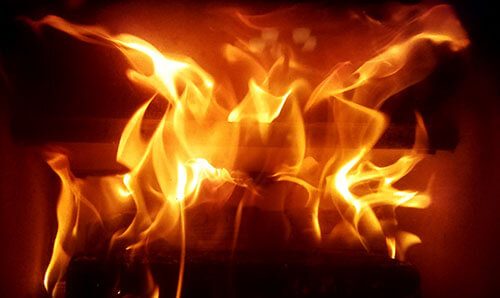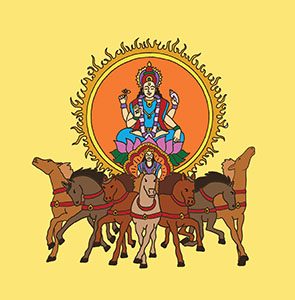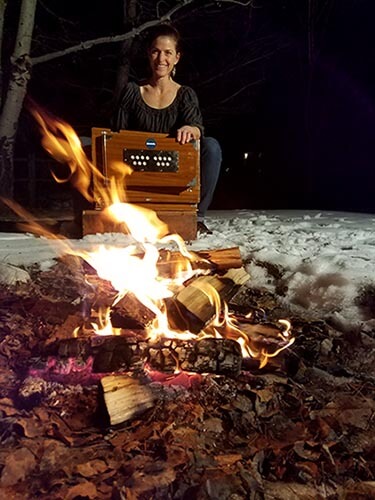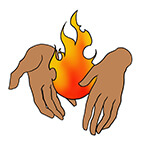
Hindu Fire God: Agni Deva
The Hindu fire god is known as Agni Deva. He is a masculine deity who embodies primordial fire, holy fire, or spiritual fire. Fire is the perfect metaphor for the transformation of unwanted patterns, situations, and personal characteristics. Fire is an expression of both light and heat. These are two fundamentals for the sustenance of life.
Table of Contents
Share this page with a friend!
Fire Symbolism
Symbolic and physical fire have been associated with religious traditions around the world for ages. Fire means life and energy as well as destruction. Fire can take many forms in the universe including lightning, the rays of the sun, physical fire, and divine radiation. The fire element is one of the fundamental elements of nature in the Vedic Five element system (air, space, fire, water and earth).
Fire and the Five Elements
The Vedic five element system is similar to Chinese feng shui but developed separately in India. The five elements can be used to classify types of artwork, personalities, food and much more. Learn more about the Chinese and Vedic systems in Mantras and the Five Elements.
Watch over 200 videos on our YouTube channel!
Origin of the Hindu Fire God
“Agni” is the Sanskrit word for “fire.” “Deva” is a masculine form of God; “Devi” would be a feminine form or goddess. According to Hindu folklore, fire was originally a force that was devouring everything on earth. Then the Creator (Brahma) modified fire so that Lord Agni would be a purifier rather than the destroyer of everything he touched.
Ayurvedic Medicine and Fire Mantras
In the Vedic healing tradition, fire mantras have been used to bring the fire element into the physical body for purification and balance. Fire mantras can also support the health of the liver and digestion. Some traditions view the liver as a physical place where old emotions and memories are held in the body. In addition, mantras to the fire element have traditionally been recommended for maintaining a healthy weight through the support of vigorous metabolism.
Watch over 200 videos on our YouTube channel!
Agni Mantra to the Hindu Fire God
The lyrics to this mantra are “OM Agni Devaya Namaha.” OM is the primordial sound often viewed as the hum of the universe. OM focuses the mind and is often used at the beginning of mantras. Devaya means “I serve or give offerings to God.” Namaha means “I bow or I honor.” The meaning of this mantra can be translated as, “I give honor to God as the element of fire.”
Name Translation for Agni Deva
Agni Deva is primordial fire or the lord of fire, sometimes translated as the God of Fire. The word “agni” is further associated with the Latin word “ignis” meaning to ignite or light on fire. Agni Deva can be viewed as a messenger between man and the gods. This is because offerings through fire reach the higher spheres.
Role of Agni Deva in Hinduism
Agni dwells in every home and must be part of all forms of sacrifice and worship. Without Agni, the gods cannot be satisfied through rituals. Agni blesses every occasion including birth, marriage and death. It is Lord Agni who formed the sun and the stars.
Watch over 200 videos on our YouTube channel!
Names of the Hindu Fire God
Gods and goddesses in the Hindu tradition often have many names. They may have 108 names or even 1008 names. These numbers are considered to be sacred. For example, malas are strings of beads used to count mantras. Malas are similar to rosaries. Traditional malas have 108 beads.
Why Hindu Gods Have Many Names
Each deity represents multiple functions or aspects of the cosmos. This is one reason for their many names. Another reason is the many different languages and cultures in India. Each culture has understood the gods and goddesses in their own distinct way. A few of the names of the Hindu fire god are given below with their meanings.
Vahni – Travels with wind
Dananjaya – Helps to earn wealth
Jwalana – Glittering, glowing
Jataveda – He who knows and creates all
Barhi – Creeping, crawling
Sushma – One who dries everything
Krishnavartma – Maker of black smoke
Sochiskesa – One who has flame as his hair
Usharbuh – Bright in the morning
Asrasya – One who burns everything
Brhatbanu – One who creates light
Pavaka – One who purifies
Rohitasva – One who has a red horse
Vayusaka – Friend of the wind
Shikavan – One who has flames
Asusukshani – Dries anything at once
Hutabuk – Everything offered to him is eaten
Dahana – One who makes everyone feels hot
Havyavahana – One with wind as a vehicle
Saptarchi – One who has seven flames
Damuna – One who subdues or makes quiet
Chitrabanu – Colourful light
Vivavasu – Light is his wealth
Suchi – One who purifies everything
Video Shorts: Hindu Gods and Goddesses
Watch over 200 videos on our YouTube channel!
Symbolic Family of Agni Deva
According to Indian mythology, Lord Agni married a goddess named Svaha. “Svaha” is a word often used at the end of mantras, especially those invoked during fire ceremonies. Svaha is a feminine noun meaning sacrifice, offering or oblation.
Origin of the Goddess Svaha
Svaha also means an auspicious ending. Svaha derives from Sanskrit root words meaning “to call the good.” In Tibetan, the word is often translated and pronounced as “soha.” Svaha represents a shakti (feminine) power that cannot be burned by sacred fire.
Descendants of Agni Deva and Svaha
Svaha and Agni had three sons: Pavaki (the purifier), Pavamana (purifying) and Suchi (purity). From these sons, Agni and Svaha had forty-five grandchildren, all representing various aspects of fire.
Watch over 200 videos on our YouTube channel!
Sun God and the Fire Element
In addition to Agni Deva, the Hindu sun god called Surya is another type of fire god. Surya is the ultimate source of light, fire or life. Surya rides golden chariot driven by Aruna, a personification of the dawn. The chariot is pulled by seven horses representing the seven chakras or energy centers. The sun is usually associated with the masculine; the moon with the feminine.

Vedic Astrological Mantras
In Vedic astrological mantras, the Sanskrit seed syllable “sam” (pronounded “sum”) connects to the fundamental vibration of the sun, the giver of life and energy in this physical dimension. The use of an astrological mantra is a significant part of this branch of Vedic sciences. An astrological mantra mitigates challenging aspects and amplifies positive configurations.
When to Use an Astrological Mantra
There are specific times when astrological mantras are purported to be the most effective: solstices, equinoxes, eclipses, new and full moons and sunrise, noon and sunset. However, astrological mantras can be used at any time. Listen to these mantras in Astrology Mantras.
Spiritual Fire and the Holy Spirit
The Holy Spirit in Christianity is an undifferentiated power of God. In this form, God is associated with the breath, fire, and the wind. God as the Holy Spirit comes as tongues of fire, as a purifying fire, or as a flame. The Western Holy Spirit is somewhat akin to Shiva, third person of the Hindu Trinity, as well as Agni Deva. Fire is also an important part of symbolism associated with the heart. Depictions of Jesus often show his heart blazing with sacred fire.
Download artwork on our FREE STUFF page!
Gifts of the Holy Spirit
The idea that God breathes life and spirit into animate form is also a common theme in many traditions. The Holy Spirit is also known as the Holy Ghost. There are seven gifts of the Holy Spirit: wisdom, understanding, counsel, fortitude, knowledge, piety, and fear of the Lord. Learn more and listen to music videos of Western Sacred Songs.
Author Kathleen Karlsen
Kathleen Karlsen is a musician, artist, writer and speaker. She is the author of two books (Flower Symbols and Vocal Medicine) and over 200 articles. Kathleen, her husband Andrew, and their five children live in Bozeman, Montana. More about Kathleen Karlsen.
AGNI DEVA ARTICLE SUMMARY
Agni Deva literally means “Fire God.” Agni Deva is the Hindu fire god, an embodiment of holy fire or spiritual fire. This article includes fascinating stories in the Hindu tradition about the role of fire in creation and spiritual practice. The article also includes a video with a mantra to Agni Deva.






